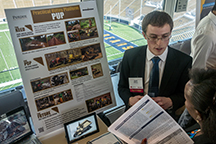Purdue students recognized at national conference for innovative project for sub-Saharan African farmers
December 16, 2014
 |
|
Purdue agricultural and biological engineering graduate student David Wilson pitches his Practical Utility Platform vehicle, or PUP, for sub-Saharan Africa farmers at the Student Innovation Marketplace during TechCon. Wilson, along with Purdue team partner and fellow graduate student Jeremy Robison, finished second overall at the event. (Purdue University photo/provided) |
WEST LAFAYETTE - A Purdue University graduate student team claimed second place for its low-cost multipurpose utility vehicle for sub-Saharan Africa farmers at USAID's Student Innovation Marketplace competition, an event that drew student teams from across the country.
David Wilson and Jeremy Robison, who are both studying agricultural and biological engineering, used an innovation grant from the Global Center for Food Systems earlier this year to position their project for the Student Innovation Marketplace.
The Sisu Global Health won the event, which was held Nov. 8-10 in Bay Area, California. Forty-four student teams from eight Higher Education Solutions Network (HESN) laboratories and universities participated.
"I think we had a leg up because our project was older than many other ones. We had more data, so to speak, and we also had a tangible product that many people could relate to," Wilson said.
The Purdue Practical Utility Platform vehicle, or PUP, has evolved since the university formed a partnership with a non-governmental organization (NGO) in the African country of Cameroon in 2009.
The vehicle is designed to pull small field implements for planting and cultivation. The engine can power mechanical attachments such as corn grinders and generators in sub-Saharan Africa, where a lack of resources can hinder transportation and agricultural processes.
"The use of local materials and only basic manufacturing requirements keeps the vehicle cost under $2,000 U.S. dollars," Robison said.
Three PUP vehicles have already been produced and are being used by farmers in Cameroon for harvest.
Five years ago, Purdue's Department of Agricultural and Biological Engineering partnered with the African Centre for Renewable Energy and Sustainable Technologies (ACREST) to develop what was then called a basic utility vehicle (BUV). John Lumkes, an associate professor of agricultural and biological engineering and associate director of the Purdue Global Engineering Program, has served as project adviser.
Students from other engineering disciplines and the colleges of Agriculture and Technology have contributed to the vehicle project, which was designed to be low-cost, durable, adaptable and easily manufactured.
The first Purdue vehicle for Cameroon was constructed mostly of wood. The new model features more angle iron and car driveline parts that can be recycled from a junkyard. Other notable changes include adding a front strut to allow for braking on all three wheels, front suspension and a 5-speed transmission with reverse.
Student Innovation Marketplace competitors were first voted on by popularity. After that, a panel of judges chose which projects would place first out of three teams. Another panel ranked the top three remaining teams. Cash and in-kind rewards were given to top innovators and researchers as well as opportunities for exposure and promotion.
The Student Innovation Marketplace was part of USAID's second Technical Convening Conference. Known as TechCon, the unique event merges entrepreneurship and academics and provides a place for development experts, field practitioners and the private sector to connect with students and develop innovative solutions for international development.
This year the event was co-hosted by USAID's Higher Education Solutions Network and the Development Impact Lab at the University of California, Berkley. More than 500 participants from HESN labs across the country attended.
HESN is comprised of eight inaugural USAID development labs at universities, including the Global Center for Food Systems Innovation at Michigan State and the Development Impact Lab at UC Berkley, among others.
USAID, or the United States Agency for International Development, is the leading U.S. government agency that works to end extreme global poverty and enable and empower democratic societies to utilize their resources for change. The organization currently works in over 100 countries in a number of different areas to affect international change.
Writers: Anna Schultz, 812-447-5229, schult70@purdue.edu
Phillip Fiorini, 765-496-3133, pfiorini@purdue.edu
Sources: David Wilson, wilsondd@purdue.edu
Jeremy Robison, robisonj@purdue.edu

